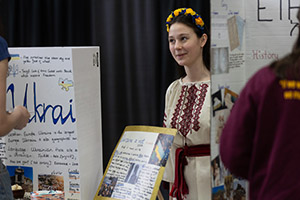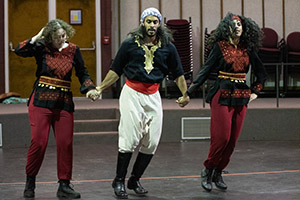10 career paths with a degree in international relations
What drew you to the title of this blog? Was it the idea of a career with lots of travel and great international food? A chance to see the world, maybe even live in a foreign country? Well, an international relations degree opens a world of possibilities, literally.
But it’s far more than just travel. You’ll learn how politics, government, money and law interact in different cultures. You’ll discover how to think critically, analyze these differences and use problem-solving skills to find ways countries and people can work together
A degree in international relations from Central Michigan isn't just about getting a piece of paper. It gives you the skills and knowledge to excel in a diverse field of jobs and change the world.
10 career paths in international relations
1. Diplomacy and foreign service
When you hear diplomat, you may think of men and women is suits at embassy parties or big tables with their countries’ flags in front of them. For many international relations graduates, a career in diplomacy is the end goal. That’s because diplomats and foreign service officers are the official representatives of their home country. They’re on the front lines of international politics. Their days are filled with building relationships and protecting their country’s interests.
Typical responsibilities:
- Negotiating treaties
- Analyzing political events
- Assisting citizens overseas
- Promoting trade
- Managing embassy operations
Potential employers: National governments, such as the U.S. Department of State; the UK's Foreign, Commonwealth & Development Office; or the equivalent ministries of foreign affairs worldwide.
2. International organizations
International organizations look at the big picture. They work across country borders to address peace, security, economic stability and human rights. They deal with the entire globe not just one country.
Typical responsibilities:
- Developing and managing global programs
- Conducting research
- Analyzing policy
- Coordinating efforts between member states to address world-wide issues like poverty or public health
Potential employers: The United Nations (UN) and its various agencies (UNICEF, WHO, UNDP), the World Bank, the International Monetary Fund (IMF), and regional bodies like the European Union (EU) or the African Union (AU).
3. Non-Governmental Organizations (NGOs)
 NGOs are independent nonprofits that usually specialize is a specific cause or political issue. They can focus on local, national or even worldwide causes.
NGOs are independent nonprofits that usually specialize is a specific cause or political issue. They can focus on local, national or even worldwide causes.
Typical responsibilities:
- Managing projects in the field
- Raising public awareness for causes like human rights, climate change, disaster relief, homelessness and access to healthcare
Potential employers: Prominent international NGOs like Amnesty International, Doctors Without Borders, Oxfam and the World Wildlife Fund (WWF).
4. International business
Businesses are constantly looking for professionals who understand global markets. An IR degree gives you the skills to understand how different political systems are affected by local cultures and economies. This can make you an asset to multinational corporations.
Typical responsibilities:
- Analyzing political and economic risks in foreign markets
- Managing cross-border trade
- Developing global marketing strategies
- Ensuring compliance with international regulations
Potential employers: Multinational corporations across all industries, international consulting firms, trade associations, import/export businesses, pharmaceutical companies and many more.
5. Intelligence and national security
If you would like to gather and sift through intelligence reports to discover patterns and threats, a career in the intelligence community may be for you. Your IR degree can help you develop a deep understanding of global threats and political motivations.
Typical responsibilities:
- Gathering and analyzing intelligence from various sources
- monitoring political threats
- briefing policymakers on security issues
- developing counter-terrorism strategies
Potential employers: Government intelligence agencies like the Central Intelligence Agency (CIA) or National Security Agency (NSA) in the U.S., MI6 in the U.K. and private security consulting firms.
6. Global journalism
Maybe the life of a globe-trotting journalist appeals to you. An Internal Relations background will help you understand what’s going on and why so you can report back with accuracy and depth.
Typical responsibilities:
- Reporting from foreign countries
- investigating international stories
- interviewing political leaders and citizens
- analyzing how global events impact different regions
Potential employers: Major news organizations such as the BBC, CNN, Reuters, The Associated Press and Al Jazeera.
7. International law and human rights
We’re all familiar with local laws and even national laws. Professionals in this field work to uphold international law and protect the rights of people everywhere. International Relations is a great undergrad degree to build your doctorate in law degree on.
Typical responsibilities:
- Prosecuting cases of war crimes
- Advising governments on international treaties
- Advocating for victims of human rights abuses
- Working on international cases
Potential employers: The International Criminal Court (ICC), the United Nations, human rights-focused NGOs and international law firms.
8. Academia and research
The ideas and theories that shape global politics don’t appear out of nothing. They are the result of studies and research done at universities and institutions around the world. This path involves contributing to the world's understanding of international relations through teaching and scholarly work.
Typical responsibilities:
- Teaching university courses
- Publishing articles and books
- Conducting original research
- Advising policymakers based on expert analysis
Potential employers: Universities and think tanks such as the Council on Foreign Relations, the Brookings Institution or Chatham House.
9. International development and humanitarian aid
 If working in communities to improve conditions for everyone is your goal, international development offers a hands-on career. Professionals in this field set up and direct projects that address poverty, inequality and the results of wars or natural disasters.
If working in communities to improve conditions for everyone is your goal, international development offers a hands-on career. Professionals in this field set up and direct projects that address poverty, inequality and the results of wars or natural disasters.
Typical responsibilities:
- Managing projects focused on people’s needs in developing countries
- Coordinating relief efforts after natural disasters or conflicts
- Working with locals to build sustainable solutions
Potential Employers: Government aid agencies like USAID, international NGOs such as CARE or Mercy Corps and development banks.
10. Global environmental policy
Climate change is the biggest global challenge of our time. You can use your IR degree skills to get countries around the globe to cooperate and protect our planet.
Typical responsibilities:
- Analyzing environmental policies
- negotiating international climate agreements
- consulting businesses on sustainability practices
- advocating for environmental protection
Potential employers: Environmental NGOs, international organizations like the UN Environment Programme (UNEP), government environmental agencies and private sector sustainability departments.
International relations degree at Central Michigan University
Graduates of CMU’s international relations program have worked with the United Nations in South Sudan, at the U.S. Embassy in Abu Dhabi, at the Pew Charitable Trusts in Washington, D.C. and beyond.
You'll take courses that cover:
- International relations.
- Comparative politics.
- Public sector research.
- Modern ideologies.
- A closer look at political systems in your choice of: Africa, East Asia, Middle East, Europe, Latin America or general comparative public policy.
- Additional studies in such courses as Bullets not Ballots, International Law, or War and Peace Studies
In addition to classroom activities, our students get hands-on experience in a wide variety of student organizations dedicated to community advancement at the local to global levels. You can also compete against students from around the world in our United Nations simulations.
We also have an internship program where you can get relevant real-world experience in the field.